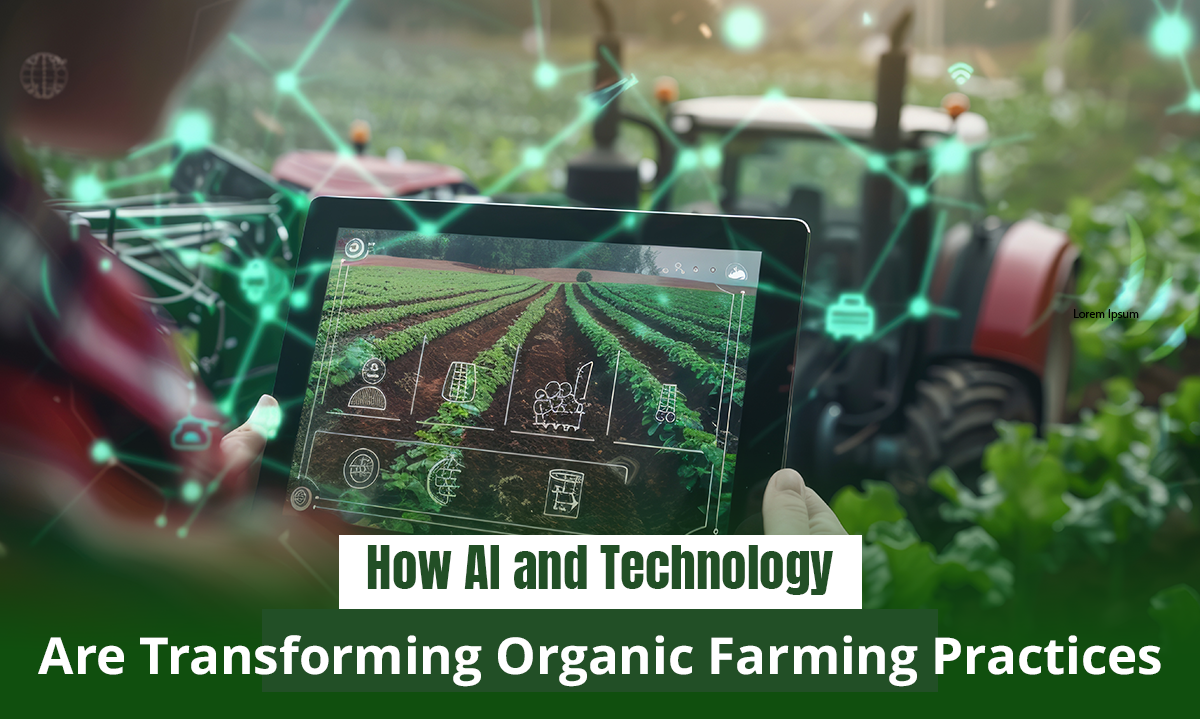Revolutionizing Organic Farming: The Role of AI and Technology

Introduction
Advances in technology and artificial intelligence (AI) are causing big changes in the farming business. Organic farming uses natural methods and benefits the environment (not an exception). As of now, using modern tools has helped organic farmers get more done, waste less, and grow better crops. The topic will explore how AI and technology are changing organic farming.
How is AI transforming organic farming?
AI is highly significant in organic farming because it gives correct replies based on data. Managing soil fertility and getting rid of pests without poisons are two problems that often come up in organic farming. Machine learning algorithms and predictive analytics are two types of AI tools that help farmers make smart choices.
For example, drones and sensors powered by AI can check the health of the soil, find places where nutrients are missing, and suggest organic fertilizers to keep things balanced. Image recognition technology can also find pests early, which lets farms use natural solutions like neem oil or companion planting to fix the problem before it gets worse. With these tools, organic farmers can get the most out of their work while still following environmentally friendly methods.
Smart Irrigation System
Ecological farming requires careful water control, and new smart irrigation technology is changing how farmers use water. These systems utilize Internet of Things devices and AI programs to monitor soil moisture levels and weather forecasts.
Smart irrigation uses accurate data to ensure crops get the exact amount of water they need, reducing waste and conserving this vital resource. This is especially beneficial in drought-prone areas where water conservation is essential. Organic farmers may grow healthy crops while following ecologically friendly procedures.
Robots in Organic Farming
Robotics is another technological advancement that is making waves in organic agriculture. Researchers are developing autonomous robots to perform labor-intensive tasks such as planting, weeding, and harvesting.
Organic growers find weed control to be a time-consuming task due to the prohibition of synthetic herbicides. AI-equipped robots can locate and eliminate weeds without hurting crops, saving time and removing the need for manual labor. These robots not only increase output but also enable farmers to concentrate on other elements of farm management.
Blockchain Technology for Transparency
Transparency is essential to gaining customers' trust in organic farming. Blockchain technology provides a safe and unchangeable ledger for tracking the path of organic fruit from farm to table.
Customers can view comprehensive details on the origins, cultivation methods, and organic status of their produce by scanning the QR code on it. This degree of openness helps organic producers stand out in the market and increases consumer confidence.
AI-Powered Market Analysis
Organic producers must have a thorough understanding of consumer preferences and market trends. To produce useful insights, AI-driven technologies examine data from a variety of sources, such as social media, retail sales, and meteorological trends.
Farmers may set competitive prices, forecast demand for certain crops, and adjust planting dates with the aid of these technologies. Organic producers can minimize waste and increase earnings while upholding their sustainability commitment by coordinating their production with market demands.
Artificial Intelligence for Sustainable Crop Management
AI is revolutionizing crop management for organic farmers. Extreme weather, infections, and pests are just a few of the possible hazards that predictive analytics can predict. Equipped with this understanding, farmers can use organic measures to protect their crops in a proactive manner.
To organically increase soil fertility, AI-based systems can also recommend companion planting techniques and crop rotations. These environmentally friendly methods are perfect for organic farming since they guarantee sustained output without the need for artificial inputs.
Energy Efficiency in Organic Farming
Organic farmers are lowering their carbon footprints thanks to technology. AI-driven climate control systems, energy-efficient greenhouses, and solar-powered equipment are all becoming more and more prevalent.
AI, for instance, can optimize growing conditions and reduce energy use in greenhouses by controlling temperature, humidity, and lighting. These developments not only reduce expenses but also complement organic farming's environmentally aware philosophy.
Benefits of Technology in Organic Farming
Combining AI and technology with organic farming offers numerous benefits.
Enhanced Efficiency: Farmers can concentrate on making strategic decisions since automation and precision tools save time and effort.
Improved Resource Management: Smart systems encourage sustainability by using less energy, water, and other resources.
Improved Crop Quality: Data-driven insights ensure the cultivation of crops under ideal conditions, resulting in produce that is healthier and of greater quality.
Consumer Trust: By increasing transparency, technologies such as blockchain promote confidence in organic certification.
Conclusion
In conclusion, AI and technology are changing organic farming by solving problems that have been around for a long time and creating new ways to be sustainable. These new technologies, like smart irrigation systems and blockchain transparency, help organic farmers grow more efficiently and sustainably while still meeting customer standards for high-quality food.
Using technology along with organic farming methods will be crucial in creating a better and more productive future as the farming industry changes. By utilizing these new technologies, organic farmers can remain innovative and contribute to a better world.
Latest blogs
JOIN OUR COMMUNITY !
Stay connected with Getfarms! Follow us on social media for the latest updates, exclusive offers, and a glimpse into the world of farmhouse living. Join our community today




























